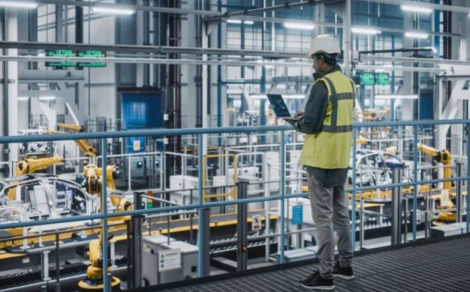The good, the bad and the future of generative AI

Stephen Hayes, Managing Director of automation and control technology specialist, Beckhoff UK, explores the benefits and risks of introducing generative AI into your manufacturing process.
Douglas Eck, principal scientist at Google Research said, “Generative AI is like having a thousand artists at your fingertips, each with their own unique style and perspective.” This also translates into the manufacturing industry, where generative AI is being introduced at every step, from design to maintenance of assets.
According to a report by MarketsandMarkets, the global market for generative AI in manufacturing is expected to grow from $73 million in 2020 to $181 million by 2026, at a CAGR of 16.4 per cent during the forecast period. The report also notes that generative AI is being used in various manufacturing applications, including design optimisation, process optimisation and predictive maintenance, among others.
Benefits to manufacturing businesses
The benefits of using generative AI in manufacturing are clear in a recent case study from Siemens, who used generative design to optimise the design of a gas turbine blade. The AI generated thousands of potential designs, which were then evaluated for their performance and manufacturability. The final design was not only more efficient, but also reduced the number of individual components needed to make the blade, resulting in cost savings and a shorter manufacturing time.
As well as optimising designs, generative AI can be used in engineering and manufacturing to reduce material waste and improve production processes. It can help generate new ideas for designs based on specific criteria and constraints, simulate and test different scenarios, and provide insights to improve efficiency and quality. It can also aid in predictive maintenance and quality control.
With a significant skills shortage in UK manufacturing, particularly in areas such as engineering, robotics and automation, the introduction of generative AI could help bridge this gap. Not only can it help automate and optimise processes, but it can also free up skilled workers to focus on more complex tasks.
Additionally, generative AI can assist in training new workers by providing virtual simulations and personalised feedback to accelerate their learning. This could be vital in the coming years, since Make UK recently reported that there are around 84,000 live vacancies in UK manufacturing, slightly down from 95,000 in 2021, which represented the highest in at least 20 years, but still massively above the desired number.
Introducing challenges
Despite its clear benefits, the use of generative AI also poses significant cyber security risks. A recent report by Deloitte stated that the manufacturing industry has experienced a 300 per cent increase in cyberattacks since 2018. Additionally, a survey by the National Association of Manufacturers found that 38 per cent of manufacturers had experienced a cyber-attack in the past twelve months.
-
PPMA 2025
23 September, 2025, 9:30 - 25 September, 2025, 16:00
NEC, Birmingham UK -
Advanced Engineering Show 2025
29 October, 2025, 9:00 - 30 October, 2025, 16:00
NEC, Birmingham UK










